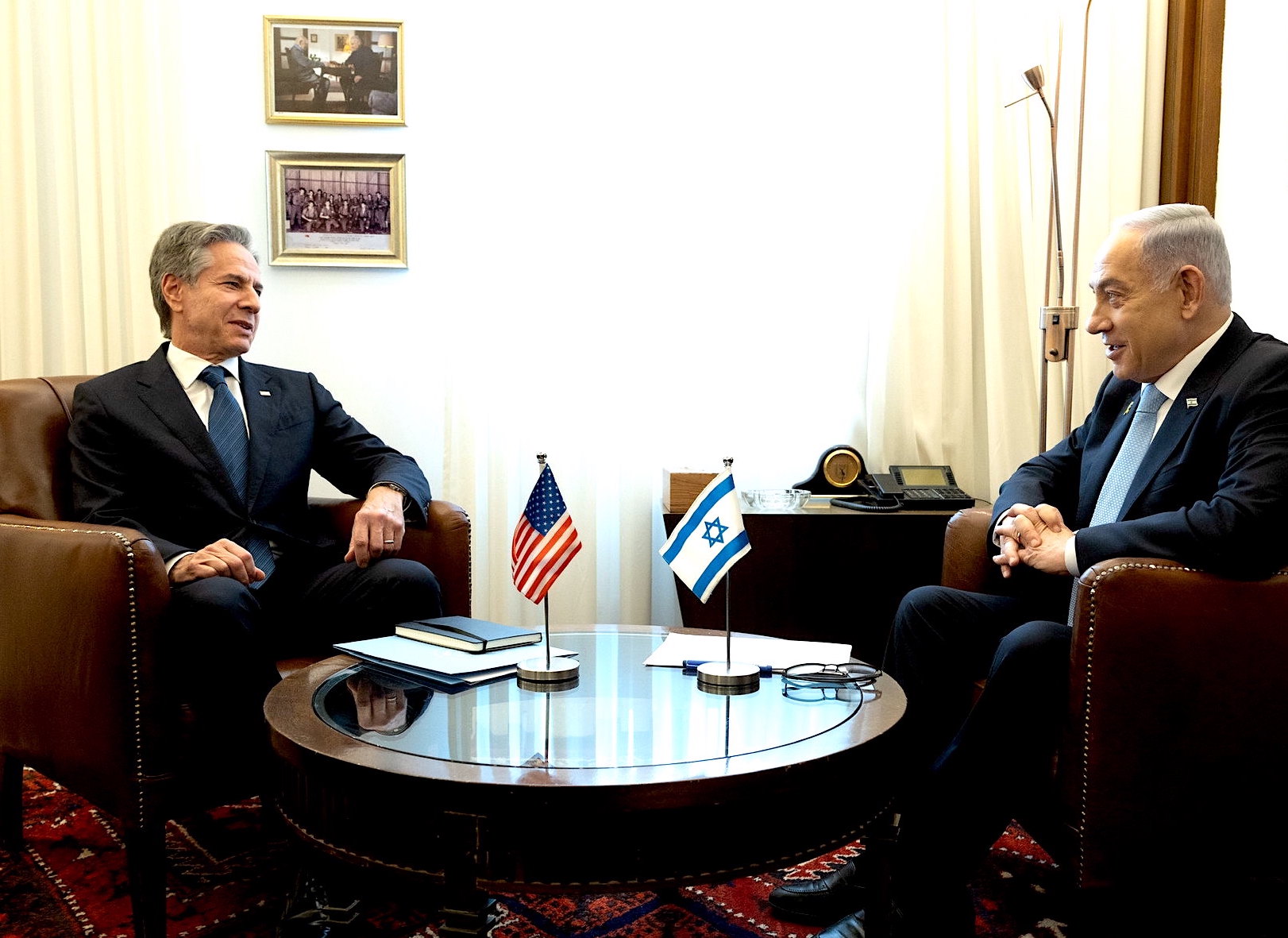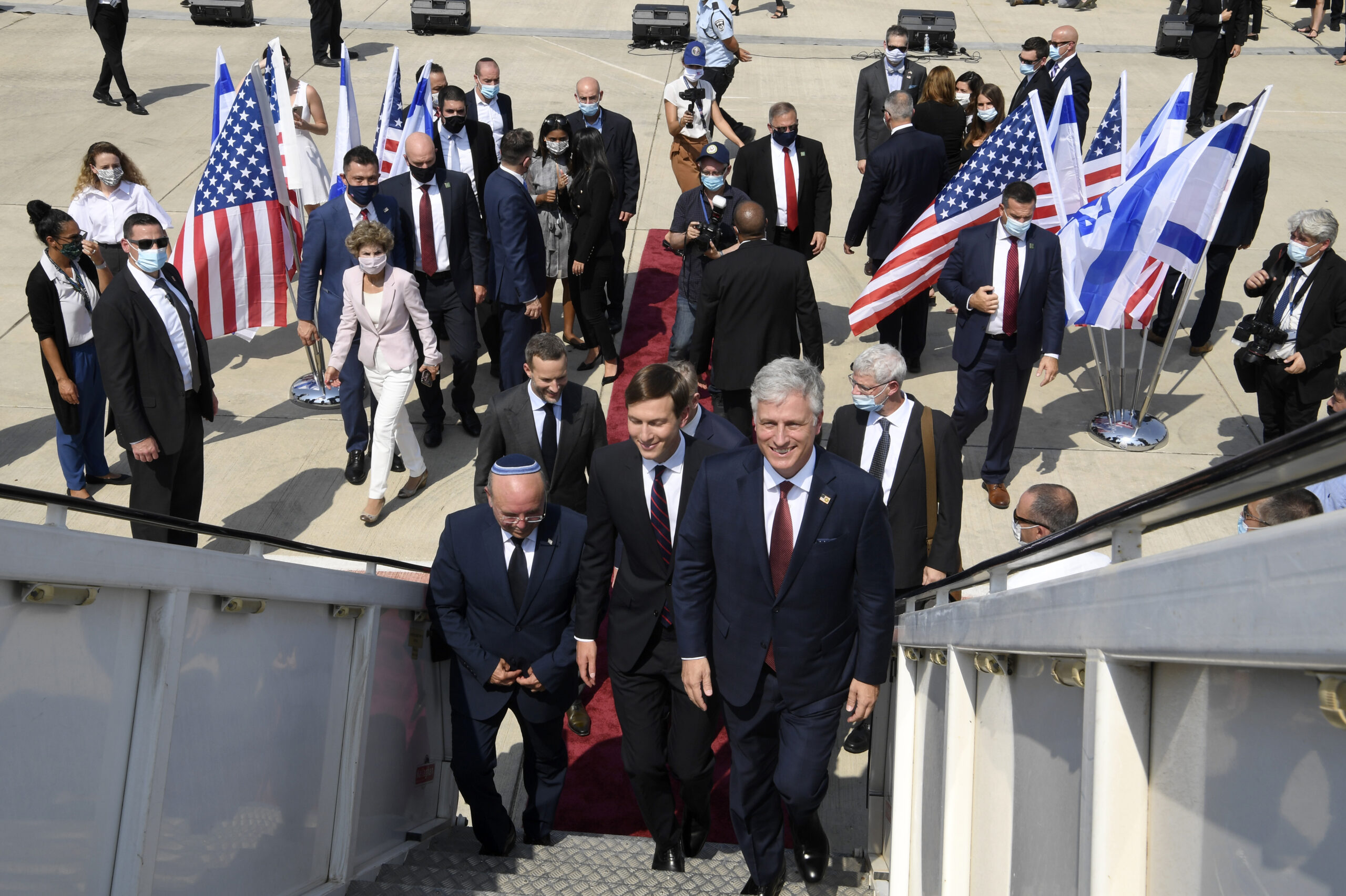Washington is endeavoring to cement Israel as the preeminent military-economic linchpin of a U.S.-led regional order, writes Tariq Dana.

U.S. Secretary of State Antony Blinken with Israeli Prime Minister Benjamin Netanyay in Tel Aviv on Monday. (State Department/ Chuck Kennedy)
By Al-Shabaka
 Washington has long aspired for Saudi Arabia to embrace Israel officially.
Washington has long aspired for Saudi Arabia to embrace Israel officially.
The bipartisan Israel Relations Normalization Act, passed by Congress in March 2022, underscored this objective, mandating the State Department to further Arab normalization with Israel based on the Trump-era Abraham Accords.
Among all possible partnerships, Saudi Arabia holds particular weight for both U.S. and Israeli interests.
The U.S. is endeavoring to cement Israel as the preeminent military-economic linchpin of a U.S.-led regional order. Within that order, Israel will serve as the hub for an anti-Iran coalition involving Saudi Arabia and other Abraham Accords partners.
Thus, understanding Saudi-Israeli rapprochement as a calculated initiative to cultivate new security alliances amid increasing global power rivalries is critical.
A U.S.-Saudi defense pact, which lies at the heart of ongoing normalization talks with Israel, speaks directly to this aim.
The pact would commit the U.S. to defend Saudi Arabia and expand Saudi access to U.S. weapons. In doing so, the arrangement would strengthen U.S.-Saudi military relations and simultaneously help to thwart Riyadh’s security cooperation with China.
Regional interests notwithstanding, the U.S. has conditioned any such agreement with Saudi Arabia on the latter’s normalization with Israel. Hence, the message to Saudi Arabia is clear: an Israeli alliance is a prerequisite for U.S. protection.
Masking the Abandonment of Palestine

U.S. Secretary of State Antony Blinken, left, arriving in Riyadh on June 7, 2023, on the second part of his trip to Saudi Arabia. (State Department/Hisham Mousa)
The Saudi regime is ostensibly making a number of Palestine-related demands as part of the normalization negotiations.
Riyadh’s stipulations reportedly include a permanent ceasefire in Gaza and a “pathway” to Palestinian statehood.
The timeline for statehood is not clear, however, and the Israeli regime would certainly place conditions on the agreement that would allow indefinite postponement of such a move.
Saudi Arabia’s attempt to tie Israeli normalization with Palestinian statehood is undoubtedly designed to provide political cover from those who may argue that the kingdom has abandoned the Palestinian cause.
In reality, normalization with Israel would be a continuation — not the start — of the Saudi’s desertion of the Palestinian struggle and its de facto acceptance of the Israeli settler-colonial status quo.
Indeed, the fruits of the Saudis’ decades-long informal relationship with the Israeli regime can currently be seen through its crackdown on domestic solidarity with Palestine and amplification of anti-Palestinian propaganda in its media coverage of the genocide.
The new Saudi school curriculum has even gone so far as to scrub the name “Palestine” from maps in school textbooks.
Despite this systematic effort to reshape public understanding of Israeli settler colonialism, the Saudi regime faces an uphill battle in trying to sway its population.
A recent survey by the Arab Center for Research and Policy Studies found that 95 percent of the Saudi public consider the Palestinian cause as a central Arab issue.
A 2023 poll by the pro-Israel Washington Institute for Near East Policy likewise indicated that 96 percent of Saudi citizens are opposed to normalization and believe Arab countries should cut all ties with Israel.
Joining the Abraham Accords

U.S.-Israeli delegation boarding the first direct El-Al flight to the U.A.E. from Israel’s Ben Gurion Airport, Aug. 31, 2020. (Matty Stern/U.S. Embassy Jerusalem, CC BY 2.0)
If a Saudi-Israeli normalization deal goes ahead, it will likely be incorporated into the expansive Abraham Accords framework. Saudi Arabia’s formal entry into this scheme carries far-reaching and dangerous ramifications for Palestine and the broader region.
Indeed, the kingdom’s immense financial clout and symbolic weight in the Arab and Muslim worlds could catalyze a domino effect. Through economic incentives or political pressure, Saudi participation may compel other Arab and Muslim nations to join this growing alliance.
Even if a formal Saudi-Israeli normalization deal remains pending until after the next U.S. president assumes office in 2025, Saudi Arabia’s determined push to legitimize a widely-condemned regime stands as a pursuit utterly divorced from global realities.
And while much of the world has awoken to Israel’s genocidal and colonial aims, Riyadh’s dogged willingness to proceed with such normalization obliterates any pretense of rational and strategic calculations, let alone solidarity with the Palestinian cause.
Tariq Dana is assistant professor of conflict and humanitarian studies at the Doha Institute for Graduate Studies, and an adjunct lecturer at Northwestern University in Qatar.
This article is from Al-Shabaka.
The views expressed are solely those of the author and may or may not reflect those of Consortium News.

“Even if a formal Saudi-Israeli normalization deal remains pending until after the next U.S. president assumes office in 2025, Saudi Arabia’s determined push to legitimize a widely-condemned regime stands as a pursuit utterly divorced from global realities.”
No, it is very much tied to global reality. The global reality is that America (i.e., the State, not the people) is an imperial superpower and wants to stay that way. The American empire is in crisis as China eclipses it economically and Russia is on par with it as a nuclear power. The world is in transition toward a multi-polar power sharing and the American imperial controllers are naturally doing everything they can to forestall that eventuality.
Corralling Saudi Arabia into normalizing relations with Israel and pushing against Iran is perfectly sensible from that perspective. And as much as anything it is vital that the US keep the Islamic states divided against one another; incessant chaos is the only political climate in which Israel can continue to exist.
Over the past 25 years, the US has brought five nations in the Middle East to the condition of failed states: Lebanon, Syria, Iraq, and Libya. Iran is on the list to be destroyed but continues to frustrate the US. Egypt and Jordan are weak and dependent on international support (World Bank, IMF, etc.). All of that contributes to American control, with Israel as America’s surrogate in the Middle East.
An agreement between Saudi Arabia and Iran is America’s worst nightmare. But gentle diplomacy by China and Russia could make it happen.
Diplomacy by force!
These continued hostile practices towards the Palestinians, Islamic sanctities and international resolutions and laws led to postponing normalization ties with Israel.
Both the Repug and the Dim National Conventions prove that the biggest elephant in the nation’s living room is the fact that Israelis are committing genocide – an absolute, undeniable fact – and the US government is enabling it because of influence from AIPAC and 350 other US Jewish political organizations – another undeniable fact – while prominent Jewish leaders publicly refuse to disclose this fact and instead show denial that this is overwhelmingly what the US Jewish community wants – as Pew Research poles clearly demonstrate. Those facts are so big and so devastating that even our “best” journalists are too afraid to make them public. This is the current state of our nation with the out Duopoly political system.
What a sickening crowd of shysters…
Thank you Tariq Dana and CN, for this analysis. Once again the USG aligns with the most tyrannical power. To oppose secular socialists, it overthrew Mossadegh to steal oil from Iran, and opposed Egypt’s Sadat despite lack of interest of the USSR in the Mideast. This has continued since the dissolution of the USSR, to get bribes from Israel to political parties (feeding back US aid).
The US could always buy oil from whomever had it there or anywhere, the same as any other country, and merely pretends to defend that interest to disguise its regime of theft and bribery. Israel has long been the primary destabilizing influence in the Mideast, as intended by UK before 1947, and has never been a contributor to anyone’s security. The USG seeks only to make trouble for bribes and weapons sales.
China has a civilized win-win approach that the US could have taken, if it had been a democracy, to resolve the Sunni-Shiah and Zionist-Arab conflicts peacefully. But we lost democracy to concentrations of military, economic, and information power.
How much will this cost us?
KSA is playing with America. They can see the future. They know the Chinese economy is rising and the corruption of the west is sinking its ship of fools. They talk to and make deals with the Chinese. One of the most important was the Chinese mediated peace deal between KSA and Blinken’s bomb target of Iran.
However, the KSA don’t want to lose their current oil sales to the west, so they play it both ways. They act nice to the west, and let them fly their corporate jets in to hold talks. But if you notice, they actually give very little in response. The conditions they put up before a ‘normalization’ deal look more like stalls to put off time. If you don’t want a deal, then ask for something you know Blinken can’t possibly give …. like Israel not acting supremicist towards everyone around them.
Polls show 95% of Saudis oppose a deal with Israel. Now, KSA is not a democracy, just like the rest of the area that Wall Street rules, so what the people think doesn’t really matter. But any ruler should at least take account of the high costs of doing something that makes 95% of your subjects mad at you. And KSA hasn’t always been the most stable of places. Its a big price to pay to tie KSA to what they already perceive as a sinking ship.
They talk to the Americans, but don’t look for any ‘breakthroughs’. Highly unlikely.
Besides, don’t forget, for the last decade, America has been trying to aggressively push down the price of oil once Obama supported fracking America to get to the shale oil. By doing so, America has pushed KSA down into deficit spending and needing to borrow money. This obviously does not make KSA happy. Not to mention that backing America’s Yemen Genocides led KSA to big problems that they are still trying to get out from under.